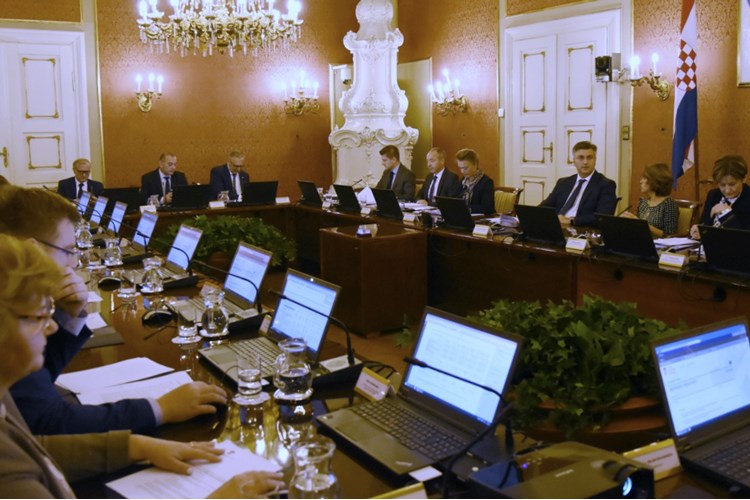


The general government deficit is expected at 0.5% of GDP or HRK 2 billion, according to the 2018 budget bill which the government will send to parliament. The growth rate is projected at 2.9%.
Tax revenues are expected to increase by 3.4% compared with this year, Maric said, adding that revenues from VAT are expected to increase by 7.3% to HRK 49.6 billion. The threshold for liability to VAT will be raised from HRK 230,000 to 300,000 as of January 1, 2018.
Revenues from special taxes and excise taxes are projected at HRK 15.4 billion, while revenues from income tax will be zero because they will be handled by local government, Maric said.
Revenues from profit tax are forecast at HRK 8.3 billion, contributions are expected at HRK 24.3 billion, and grants, mostly EU-funded, are planned at HRK 13.8 billion. Other revenues are projected at HRK 14.9 billion, of which about 800 million is expected from the sale of non-financial assets.
Expenditures are forecast at HRK 133.3 billion, which is 5 billion more than in the original budget for 2017, Maric said.
Expenditures financed from sources affecting the deficit will increase by HRK 1.27 billion, while expenditures from other sources, mostly EU funds, should rise by HRK 3.5 billion.
Expenditures on employees are projected at HRK 27.9 billion, up 1.4 billion, the main reason for the increase being the amended collective agreement with government administration employees and the higher base pay for public-sector workers, the finance minister said.
Material expenses are planned at HRK 13.2 billion, an increase of HRK 627 million, mostly due to an increase in outlays for state institutions, while financial expenditures, costs of interest and debt servicing, would be reduced by more than HRK 700 million compared with the 2017 budget.
Subsidies are projected at HRK 6.6 billion, of which 2.9 billion will go towards agriculture, Maric said, noting that in 2018 there would no longer be expenditure on shipyard restructuring.
Grants are projected at HRK 16.5 billion, up by 350 million.
Allowances for private individuals and households would increase by HRK 1.6 billion to 47.8 billion, and would mostly refer to pensions, because next year the government plans two indexations, of about 2% on average, which would increase expenses by HRK 1.42 billion.
Other expenditures, mostly for the absorption of EU funds, are projected at HRK 7.5 billion, and capital investments are forecast at HRK 4 billion, mostly covering investments in defence, healthcare, environmental protection, science and education.
Maric said that 2018 would see a further improvement of results and a continuation of fiscal consolidation. "We plan to balance the budget in 2019 and project a surplus of HRK 3.4 billion or 0.8% of GDP in 2020," he added.
The minister noted that this government had begun "a very important trend of reducing the public debt to GDP ratio" - by 2.5 percentage points in 2016 and a projected 3 percentage points in 2017, adding that this ratio was expected to drop to 76.6% in 2018, 73.4% in 2019 and below 70% of GDP in 2020.
"This is a baseline scenario. These decreases may be even stronger, depending on growth, fiscal consolidation and the activation of state assets," Maric said.
Maric also presented a draft budget revision for this year, under which total budget revenues will amount to HRK 122.45 billion while expenditures will be reduced by HRK 1.6 billion to HRK 126.8 billion.
Maric said money had been saved on budget items related to a number of ministries, the government and the parliament, but mostly the Finance Ministry, notably tax expenditures.
Under the draft budget revision, HRK 1.1 billion will be directed to the Health Ministry, of which HRK 870 million will be used for the payment of state and county hospitals' due debts.
The Science and Education Ministry will get an additional HRK 174 million for employees, following an increase in the base pay for public sector workers.
The Transport Ministry will receive an additional HRK 100 million for county road operators, the Labour Ministry will get an additional HRK 90 million, and the Finance Ministry an additional HRK 80 million for damage caused by natural disasters as well as HRK 21.3 million for transfers to 35 local government units in mountainous areas.
The ministries of the interior, foreign affairs and justice will receive an additional HRK 45 million, 32.2 million and 24.4 million respectively.
"With this budget revision we are making a significant change, notably in the health sector, as well as with regard to cases which we could not have foreseen in the original budget, primarily natural disasters. It is especially important to note that the budget deficit this year is HRK 2.5 billion lower than originally planned, meaning that we are lowering the general government deficit by HRK 2.2 billion to 0.6% of GDP, which is almost half a billion kuna better than the historic result we had last year," Maric concluded.
Economy Minister Martina Dalic said that the most important feature of both the budget revision for 2017 and the draft budget for 2018 was "that they continue on a steady path of reducing the deficit, thus contributing to the reduction of public debt and indebtedness, which is one of the government's most important strategic and economic goals."
She congratulated Maric on pursuing a responsible fiscal policy and called on all ministries to keep controlling their expenses regardless of the current economic growth.
She called for "greater control of the expenditure so that we could reduce the debt, balance the deficit and create a counter-cyclical policy environment that will create reserves if worse times come, so that we can react with full force and avoid a situation like the one that happened at the beginning of the 2008 crisis."
Text: Hina